Evaporative Emission System Hoses/Pipes Replacement Engine
Removal Procedure
- Disconnect the negative battery cable.
- Remove the engine cover. Refer to Engine Cover Replacement in Body and Accessories.
- Disconnect the EVAP line from the EVAP purge solenoid. Refer to Plastic Collar Quick Connect Fitting Service .
- Disconnect the EVAP (2) line from the EVAP front chassis line (1). Refer to Plastic Collar Quick Connect Fitting Service .
Caution: Unless directed otherwise, the ignition and start switch must be in the OFF or LOCK position, and all electrical loads must be OFF before servicing any electrical component. Disconnect the negative battery cable to prevent an electrical spark should a tool or equipment come in contact with an exposed electrical terminal. Failure to follow these precautions may result in personal injury and/or damage to the vehicle or its components.
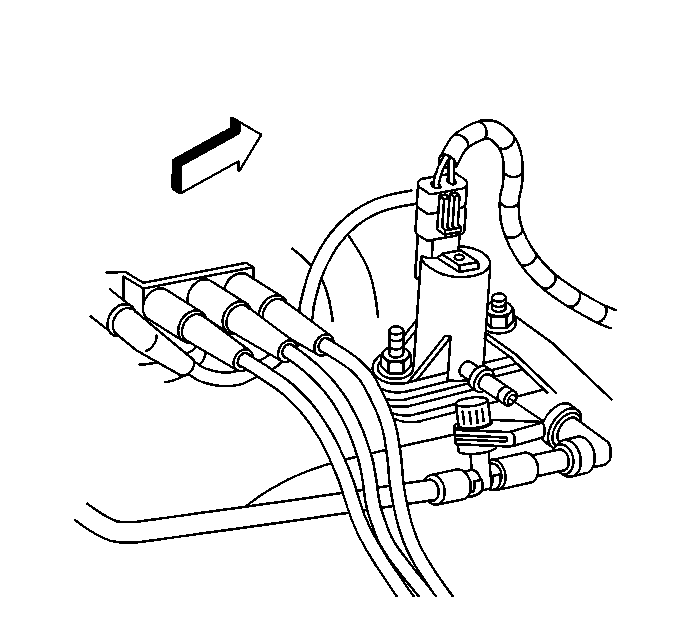
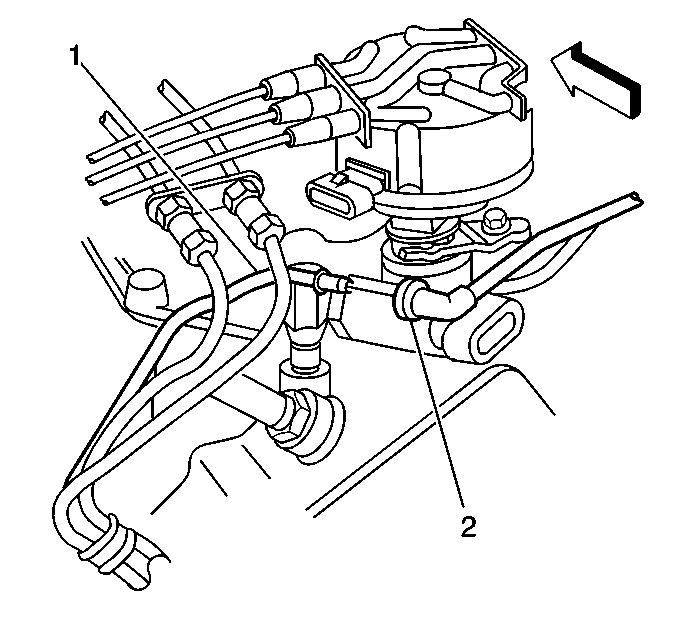
Installation
- Connect the EVAP line (2) to the EVAP front chassis line (1). Refer to Plastic Collar Quick Connect Fitting Service .
- Connect the EVAP line to the EVAP purge solenoid. Refer to Plastic Collar Quick Connect Fitting Service .
- Connect the negative battery cable.
- Install the engine cover. Refer to Engine Cover Replacement in Body and Accessories.


Evaporative Emission System Hoses/Pipes Replacement Front Chassis
Removal Procedure
- Remove the engine cover. Refer to Engine Cover Replacement in Interior Trim.
- Clean all the pipe connections and the surrounding areas before disconnecting the pipes in order to avoid possible contamination.
- Disconnect the chassis EVAP pipe from the engine compartment EVAP pipe. Refer to Plastic Collar Quick Connect Fitting Service .
- Raise the vehicle. Refer to Lifting and Jacking the Vehicle in General Information.
- Remove the fuel/EVAP pipes retainer mounting stud (7) from the cylinder head.
- Remove the fuel/EVAP pipes retainer mounting stud (6) from the transmission.
- Remove the fuel/EVAP pipes retainer mounting fastener (5) from the crossrail.
- Remove the EVAP pipe from the transfer case bracket clip (4 wheel drive only).
- Disconnect the chassis EVAP Pipe from the EVAP canister purge pipe (3). Refer to Plastic Collar Quick Connect Fitting Service .
- Note the position of the EVAP pipe for aid in installation.
- Remove the EVAP pipe from the retaining clips.
- Remove the EVAP pipe.
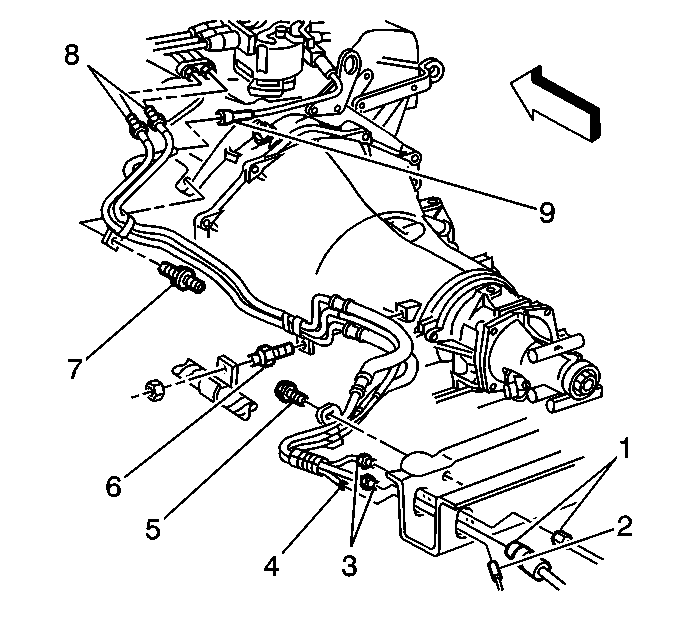
Caution: To avoid any vehicle damage, serious personal injury or death when major components are removed from the vehicle and the vehicle is supported by a hoist, support the vehicle with jack stands at the opposite end from which the components are being removed and strap the vehicle to the hoist.
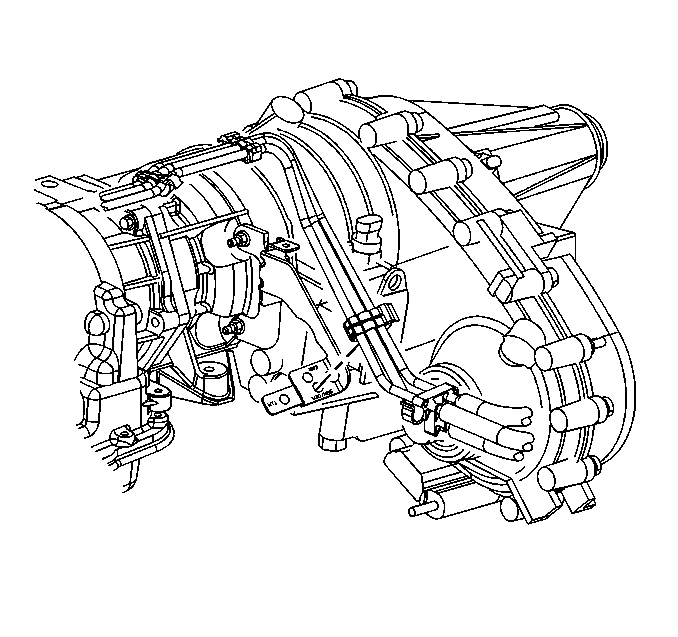
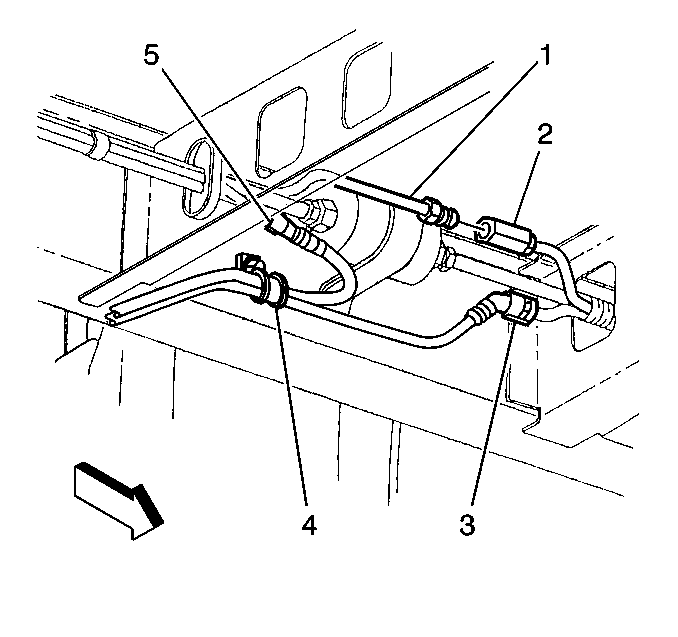
Installation Procedure
- Connect the chassis EVAP pipe to the EVAP canister purge pipe (3). Refer to Plastic Collar Quick Connect Fitting Service .
- Install the EVAP pipe into the transfer case bracket clip (4 wheel drive only).
- Install the EVAP pipe into the transmission bracket retainer.
- Install mounting stud (6).
- Install the EVAP pipe into the cylinder head retainer.
- Install the mounting stud (7).
- Install the EVAP pipe into the crossrail retainer.
- Install the retainer mounting fastener (5) to the crossrail.
- Lower the vehicle.
- Connect the chassis EVAP pipe to the engine compartment EVAP pipe. Refer to Plastic Collar Quick Connect Fitting Service .
- Install the engine cover. Refer to Engine Cover Replacement in Interior Trim.

Important:
• When replacing the fuel/EVAP pipes, always replace them with original
equipment or parts that meet the GM specifications for those parts.
The replacement pipes must have the same type of fittings as the original
pipes in order to ensure the integrity of the connection. • Do Not use copper or aluminum tubing to replace steel tubing.
Only tubing meeting the 124-M specification or its equivalent is capable
of meeting all pressure, corrosion and vibration characteristics
necessary to ensure the durability standard required.


Notice: Use the correct fastener in the correct location. Replacement fasteners must be the correct part number for that application. Fasteners requiring replacement or fasteners requiring the use of thread locking compound or sealant are identified in the service procedure. Do not use paints, lubricants, or corrosion inhibitors on fasteners or fastener joint surfaces unless specified. These coatings affect fastener torque and joint clamping force and may damage the fastener. Use the correct tightening sequence and specifications when installing fasteners in order to avoid damage to parts and systems.
Tighten
Tighten the mounting stud to 7 N·m (62 lb in).
Tighten
Tighten the mounting stud to 33 N·m (24 lb ft).
Tighten
Tighten the mounting fastener to 11 N·m (97 lb in).
Evaporative Emission System Hoses/Pipes Replacement Rear Chassis
Removal Procedure
- Disconnect the EVAP canister fuel vapor pipe (5) from the rear chassis EVAP pipe.
- Disconnect the EVAP pipe (7) from the fuel tank EVAP pipe (5). Refer to Plastic Collar Quick Connect Fitting Service .
- Release the fuel/EVAP pipe grommet (2) from crossrail.
- Remove the fuel/EVAP pipe retainer fastener (3) from crossrail.
- Release the EVAP pipe from the retainer (8) and the grommet (2).

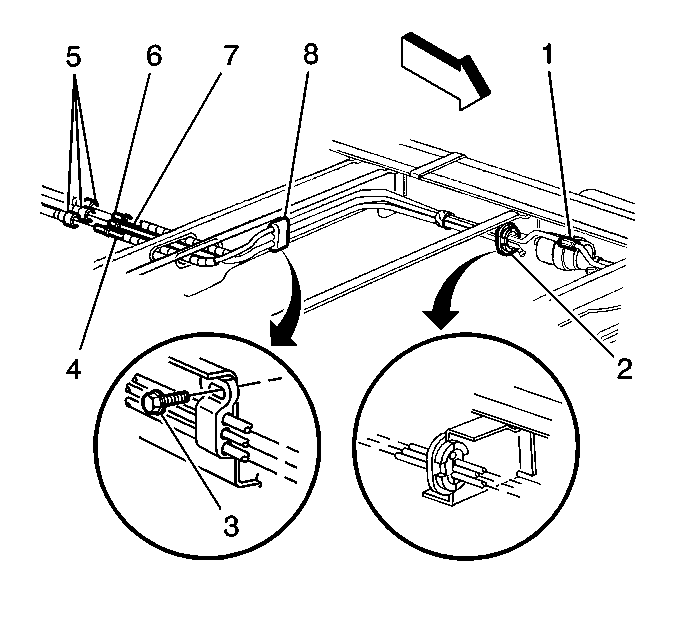
Installation Procedure
- Position the new EVAP pipe through the crossrails in the original location.
- Position the EVAP pipe into crossrail retainer (8) and crossrail grommet (2).
- Install fuel/EVAP pipe grommet (2) into crossrail.
- Lubricate the grommet to aid in installation.
- Install fuel/EVAP pipe retainer fastener (3) to crossrail.
- Apply a few drops of clean engine oil to the rear male connector pipe ends.
- Connect the EVAP pipe (7) to the fuel/EVAP tank pipe (5). Refer to Plastic Collar Quick Connect Fitting Service .
- Connect the EVAP canister fuel vapor pipe (5) to the rear chassis EVAP pipe.

Caution: Always apply a few drops of clean engine oil to the male pipe ends before connecting the fuel pipe fittings in order to reduce the risk of fire and personal injury. This will ensure proper reconnection and prevent a possible fuel leak. During normal operation, the O-rings located in the female connector will swell and may prevent proper reconnection if not lubricated.
Notice: Use the correct fastener in the correct location. Replacement fasteners must be the correct part number for that application. Fasteners requiring replacement or fasteners requiring the use of thread locking compound or sealant are identified in the service procedure. Do not use paints, lubricants, or corrosion inhibitors on fasteners or fastener joint surfaces unless specified. These coatings affect fastener torque and joint clamping force and may damage the fastener. Use the correct tightening sequence and specifications when installing fasteners in order to avoid damage to parts and systems.
Tighten
Tighten fuel/EVAP pipe crossrail retainer to 11 N·m (97 lb in).

Evaporative Emission System Hoses/Pipes Replacement Fuel Tank
Removal Procedure
- Disconnect the negative battery cable.
- Remove the fuel filler cap.
- Relieve the fuel system pressure. Refer to Fuel Pressure Relief .
- Drain the fuel tank. Refer to Fuel Tank Draining .
- Disconnect the fuel return (4), fuel feed (6), and EVAP line (7) from the fuel tank lines (5). Refer to Plastic Collar Quick Connect Fitting Service .
- Drain gasoline from pipes into an approved container.
- Remove the fuel tank. Refer to Fuel Tank Replacement .
- Remove the EVAP pipe (1) from the fuel tank sending unit (2). Refer to Plastic Collar Quick Connect Fitting Service .
Caution: Unless directed otherwise, the ignition and start switch must be in the OFF or LOCK position, and all electrical loads must be OFF before servicing any electrical component. Disconnect the negative battery cable to prevent an electrical spark should a tool or equipment come in contact with an exposed electrical terminal. Failure to follow these precautions may result in personal injury and/or damage to the vehicle or its components.

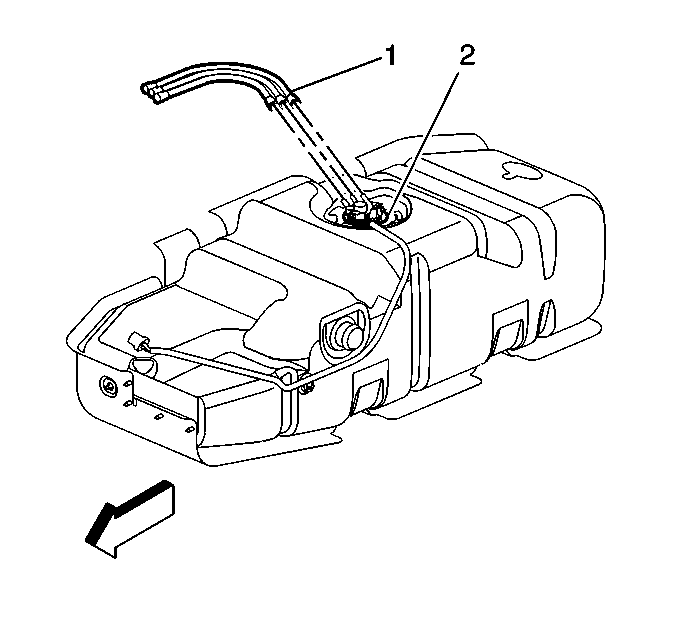
Installation Procedure
- Install the EVAP pipe (1) to the fuel tank sending unit (2). Refer to Plastic Collar Quick Connect Fitting Service .
- Install the fuel tank. Refer to Fuel Tank Replacement .
- Connect the fuel return (4), fuel feed (6), and EVAP line (7) to the fuel tank lines (5). Refer to Plastic Collar Quick Connect Fitting Service .
- Tighten the fuel filler cap.
- Connect the negative battery cable.
- Inspect for a fuel leak.

Caution: Always apply a few drops of clean engine oil to the male pipe ends before connecting the fuel pipe fittings in order to reduce the risk of fire and personal injury. This will ensure proper reconnection and prevent a possible fuel leak. During normal operation, the O-rings located in the female connector will swell and may prevent proper reconnection if not lubricated.

| 6.1. | Turn ON the ignition for 2 seconds. |
| 6.2. | Turn OFF the ignition for 10 seconds. |
| 6.3. | Turn ON the ignition. |
| 6.4. | Inspect for fuel leaks. |
